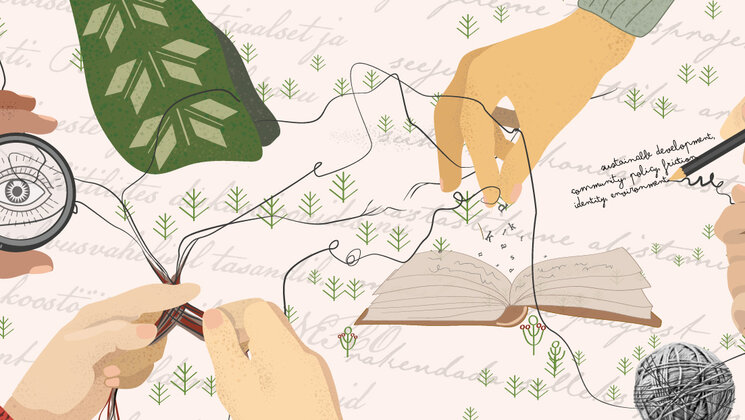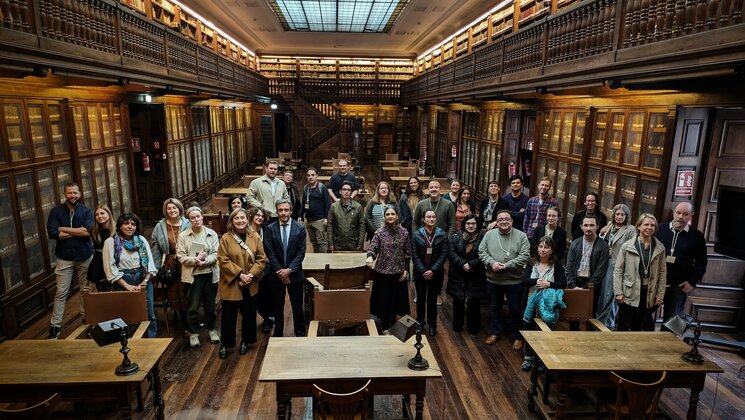Vaimse pärandi ja kestliku arengu seostele pühendatud veebiseminaride sari ootab osalema
Pariisi Cergy ülikooli vaimse kultuuripärandi ja kestliku arengu UNESCO õppetool kutsub kõiki huvilisi osalema oktoobrist juunini vältavates vaimse pärandi ja kestliku arengu küsimusi lahkavates veebiseminarides.
Vaimse pärandi vallas tegutsevate UNESCO õppetoolide koostöös sündiva seminaride sarja juhatas reedel, 14. oktoobril kell 15 (EET) sisse Tartu ülikooli vaimse kultuuripärandi rakendusuuringute UNESCO õppetooli juhataja, kultuuriteaduste professor Kristin Kuutma arutelu kestliku arengu ideaalide ja pärandipoliitikaga seotud ebavõrdsuse ilmingute teemal.
Zoomi link (parool: g3HqFM)
Täpsem info:
Chiara Bortolotto, Cergy ülikooli vaimse kultuuripärandi ja kestliku arengu UNESCO õppetooli juhataja, chiara.bortolotto@cyu.fr
AJAKAVA
- 14.10.2022 15.00-17.00 EET
Kristin Kuutma, Vaimse kultuuripärandi rakendusuuringute UNESCO õppetool, kultuuriteaduste instituut, Tartu ülikool, Eesti
Ownership and rights: Sustainable Development ideals with inequalities of recognition and resource command
The UNESCO-defined ICH or living heritage domain and its management is fundamentally retrospective, and yet by its political alignment suggests to pursue the UN futurist Agenda 2030 for Sustainable Development Goals. This discussion will particularly engage with the goal to reduce inequalities. My critical inquiry unpacks the entangled socioeconomic implications and resource command in relation to designated heritage practices. For minority groups there emerge remarkable sites of meaning that project the dismissed rights for self-determination. Alongside resource command, these reflections analyse inequalities in the politics of recognition. My ethnographic material is based on long-term fieldwork at ICH-related targeted meetings.
Disputant: Cléa Hance, doktorant, ENS-Paris Saclay, Prantsusmaa
- 15.12.2022 15.00-17.00 EET
Crsitina Amescua, Vaimse kultuuripärandi ja kultuurilise mitmekesisuse uurmise UNESCO õppetool, multidistsiplinaarsete uuringute regionaalne keskus, Mehhiko rahvuslik autonoomne ülikool, Mehhiko
Ancestral Barter in Contemporary Morelos: sustainable practices that build regional development
There are multiple ways in which sustainable development is understood and enacted at the local and regional levels. I will discuss these issues drawing from a case in a region in central Mexico, where a barter market (along with the commercial market) is held every Sunday in the town of Zacualpan de Amilpas, Morelos, interconnecting people from the highlands and the lowlands of the Popocatepetl Volcano. As the grand parents of their grandparents did, today people from this region collect natural (not cultivated) products from their lands (fruits, vegetables, wood) as well as other products they manufacture (cloths, pottery, coal) and go to Zacualpan to trade what they have for what they need or want. In doing so, they take care of their environment, they create social bonds, exchange knowledges and skills, and ensure a healthier and more varied diet for their families during the week. A wide variety of non monetary transactions are carried out as negotiations take place in nahuatl and spanish to agree on the value of the elements to be exchanged. Barter is a very complete example of how Intangible cultural heritage is at the same time a reservoir of local knowledges and a mechanism to constantly build solid and cohesive communities and groups.
Disputant: Regina Bendix, Kultuuriantropoloogia/Euroopa etnoloogia instituut, Göttingeni Georg-Augusti ülikool, Saksamaa
- 9.02.2023 15.00-17.00 EET
Marc Jacobs, Kriitiliste pärandiuuringute ja vaimse kultuuripärandi kaitse UNESCO õppetool, Brüsseli Vaba ülikool, Belgia
Context matters. And CGIs, Respect, Safeguarding ICH, Triple P, Doing Good, Emotions and We Too
The twelve ethical principles for the safeguarding of intangible cultural heritage in the Basic Texts of the 2003 Convention of UNESCO are like ballet: wonderful, but they can hurt if you take them serious and apply them. Dancing ‘en pointe’ and many splits may be needed then: when the going gets tough, will the tough get going for ballet/complex and elegant ethics? The dozen is contradictory, aspirational and sometimes extreme. The set of ethical principles tries to capture many tensions, including those yielded by instruments of glocal ethics in the UN family, like the sustainable development goals, but also by global woke waves or activism. There is still a big part lacking of what was promised in 10.COM 15.A. But will the diplomatic experts in the Intergovernmental Committee, the Living Heritage Entity and savvy activists cultivate the subtle tools, procedures and platforms now they have tasted the power of delisting items of intangible cultural heritage to set examples, address traumas and de/recontextualize? Is unsafeguarding ICH by UNESCO now revealing that the 2003 Convention paradigm is part of the long history of trying to deal with and to reform popular culture?
- 30.03.2023 15.00-17.00 EET
Pier Luigi Petrillo, Vaimse kultuuripärandi ja võrdleva õigusteaduse UNESCO õppetool, õigusteaduse ja majanduse osakond, Rooma ülikool Unitelma Sapienza, Itaalia
Disputant: Anita Vaivade, Vaimse kultuuripärandi poliitika ja seaduse UNESCO õppetool, Läti kultuuriakadeemia, Läti
- 11.05.2023 15.00-17.00 EET
Tiago de Oliveira Pinto, Transkultuuriliste muusikauuringute UNESCO õppetool, musikoloogia osakond, Weimari Franz Liszti muusikaülikool & Jena Friedrich Schilleri ülikool, Saksamaa
Disputant: Ahmet Erman Aral, Vaimne kultuuripärand formaalses ja mitteformaalses hariduses UNESCO õppetool, Türgi rahvaluule osakond, Ankara Hacı Bayram Veli ülikool, Türgi
- 06.06.2023 15.00-17.00 EET
Magistrantide ja doktorantide ettekanded
Ettekande tegemise soovist andke, palun, teada Cergy ülikooli vaimse kultuuripärandi ja kestliku arengu UNESCO õppetooli juhatajale Chiara Bortolottole (chiara.bortolotto@cyu.fr).




